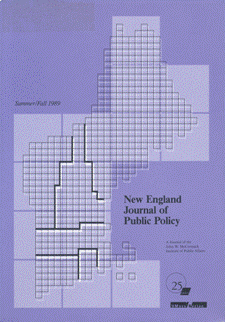Volume 5, Issue 2 (1989)
Decades beget catchwords to describe them, but the 1980s may defy our best efforts to capture them in one pithy phrase. For a time it appeared that the "me generation" would suffice, but this was essentially an introspective generalization drawing on a parochial perspective: America preoccupied with America rather than with the broader world beyond its borders.
Perhaps the explosion of the Challenger on that bright Tuesday morning in January 1986 has much to do with our self-doubt, with our realization that while we might still regard ourselves as being first among equals, we were no longer preeminent. For the Challenger catastrophe was a symbol both of the immense technological forces we had mastered and of their mastery over us. It made us a witness to our own vulnerability, reminding us of our limitations — limitations from which we have sought to free ourselves but which always elude our attempts to do so, intimating the mortality not just of our own lives but of whole generations and the ideas that give them vision.
The old order is dead, the "evil empire" transmogrified into perestroika and glasnost; Poland and Hungary lifted the iron curtain and marched to the beat of their own drummers; China opened up for one brief shining moment and closed in on itself with the slaughter in Tiananmen Square; arms control agreements signed, nuclear weapons actually destroyed, the Cold War suddenly an anachronism. Japan emerged as the world's dominant economic power, the European Economic Community moved closer to a single market of 320 million people, the world economy to the globalization of the marketplace, and the United States fed itself on public voyeurism and budget deficits that bled future generations of their heritage.
Which brings us to this issue of the New England Journal of Public Policy and to questions related to the social, economic, political, or ideological parameters that provide the context in which policy decisions are made and implemented, either proactively or reactively, or in which the institutional or administrative structures themselves are capable only of providing obsolete answers to convenient questions.
Front Matter
Editor's Note
Editor's Note
Padraig O'Malley
Articles
The Past as Prologue? What Past Industrial Conflicts within the GOP Tell about the Future of the Bush Administration
Thomas Ferguson
The Problems of Rural Reindustrialization: A Case Study of Monroe, Massachusetts
Jeanne H. Armstrong and John R. Mullin
The Happy Accident
Robert Manning
The Academic Workplace: Perception versus Reality
Sandra E. Elman
Book Review
Thinking of England
Shaun O'Connell
Back Matter

Editors
- Editor
- Padraig O'Malley
- Book Reviews
- Shaun O'Connell
- Design Coordinator
- Candace Chick